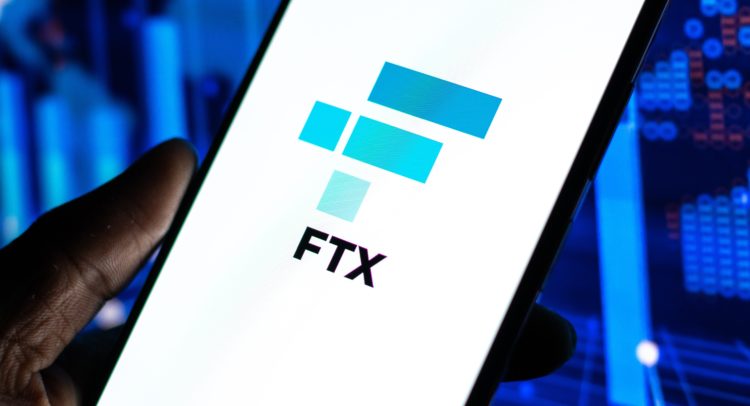FTX, the third-largest cryptocurrency exchange in the world, is undergoing the most turbulent phase of its history. Just a couple of months ago, FTX’s CEO and crypto billionaire Sam Bankman-Fried offered to buy several failing crypto companies for the greater good of the nascent industry. However, it now appears that FTX is on the cusp of joining the list of failing crypto platforms.
Meet Your ETF AI Analyst
- Discover how TipRanks' ETF AI Analyst can help you make smarter investment decisions
- Explore ETFs TipRanks' users love and see what insights the ETF AI Analyst reveals about the ones you follow.
FTX Sees High-Octane Drama Unfold
It all began last week when crypto news publisher CoinDesk posted a detailed article, sparking concerns that Bankman-Fried’s venture firm, Alameda Capital, was overly dependent on FTX’s native $FTT token. Problems started to add up quickly for FTX, given that Alameda Research is FTX’s sister company and FTX itself controls and mints the $FTT tokens.
Per the report, Alameda Research’s latest balance sheet shows an abundance of $FTT tokens in its holdings, with nearly 40% of the firm’s assets attributed to $FTT. The report played a crucial role in highlighting how Alameda Research – a crypto fund that had nearly $14.6 billion of assets under management at its peak – relies largely on a token that a sister company invented instead of fiat currencies or another cryptocurrency.
Following this scoop from CoinDesk, Binance’s CEO Changpeng Zhao (CZ) shocked the crypto market on Sunday, November 6, by announcing that Binance has started the process of liquidating all of its FTT holdings due to “recent revelations.” These revelations included Bankman-Fried’s independent efforts to improve industry regulation without the consent of peers.
Meanwhile, the crypto ecosystem, still tending to the wounds inflicted by the Terra implosion and the extended crypto winter, was quick to react. CZ’s tweet triggered a domino effect as users began speculating about the possibility of FTX battling a liquidity crisis – something that many big names have fallen prey to in 2022.
“At the end of the day, only cash is the real decision maker. Not valuation, not “strong backers” and promising assets,” stresses Andrei Grachev, the Managing Partner at DWF Labs. “If you don’t have liquidity in the form of cash, then you have no sustainability. ‘Big short’ times are not coming; they are already here.”
Between CoinDesk’s article, CZ’s tweet, and increasing speculation, FTX’s financial health quickly deteriorated after the exchange experienced withdrawals of nearly $6 billion in less than 72 hours. Accordingly, the value of FTX’s $FTT token also found itself in a downward spiral, losing nearly 83% of its in a matter of days.
On Tuesday, November 8, users took to Twitter to point out that FTX had started restricting customer withdrawals on its platform. Historically, withdrawal restrictions have served as the first warning sign that crypto platforms are on the verge of going bankrupt.
Pointing out the problem with centralized platforms halting withdrawals, Ethos CEO and Founder Adam Lavigne notes, “This further underscores the need for a move towards a decentralized solution, as the centralized contagion affects everybody in the industry. In order to better protect users in the industry, we should be encouraging users to hold funds in their own vault or wallet.”
Even though Sam Bankman-Fried clapped back at the naysayers, clarifying that ongoing concerns about FTX’s liquidity crunch are “nothing but a bunch of unfounded rumors,” it wasn’t enough to restore investor confidence.
Binance Makes Its Move on FTX
Amid growing concerns about FTX’s impending liquidity crisis, CZ rocked the crypto market again on Tuesday, November 8, via a tweet that said, “To protect users, we signed a non-binding LOI, intending to fully acquire http://FTX.com and help cover the liquidity crunch.” Soon after, FTX’s CEO Sam Bankman-Fried also posted a joint statement and several tweet threads confirming that FTX has agreed to a “strategic transaction” with Binance.
Binance has already signed a non-binding letter of intent (LoI) declaring it is ready to buy out FTX. The deal, now in motion as Binance handles due diligence, marks a significant shift in industry power dynamics.
It’s difficult to overlook the sour history between Binance and FTX in this latest stage of the saga. Back in 2019, Binance was among the handful of companies that financially backed FTX to establish itself as a prominent exchange. In 2021, Binance exited the investment with roughly $2.1 billion worth of $BUSD and $FTT tokens. At this point, FTX positioned itself as one of the biggest rivals of Binance.
What’s interesting to note here is that a public spat between the heads of the two firms that began a couple of days ago sparked a significant market selloff. While Binance’s CZ attributed the decision to dump $FTT as a risk management exercise following Luna losses, he also blamed Bankman-Fried’s regulatory lobbying efforts, heightening speculation of this being a calculated move to hurt a rival.
If the acquisition proceeds, it reflects a massive step towards consolidating Binance’s dominance over the crypto market.
Regulators Weigh in on Binance’s Acquisition of FTX
This hastened attempt by Binance to buy FTX has caught the attention of regulators, drawing “antitrust” accusations. Given that regulatory bodies have the right to block major acquisitions if they think they’re anti-competitive, this move will surely attract a lot of regulatory interest and influence the price movement of several cryptocurrencies. Indeed, the price of Bitcoin (BTC-USD) has been negatively impacted by all this drama.

From Binance’s perspective, acquiring FTX means tucking in a substantial portion of the international market that FTX dominated up until this point. In the meantime, crypto markets rest on tenterhooks awaiting a final decision from Binance as the due diligence process progresses.
















